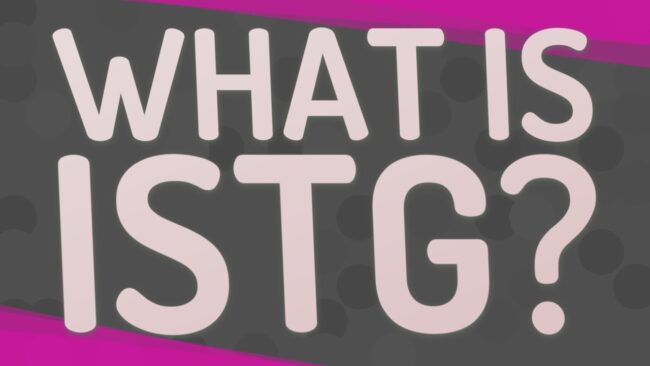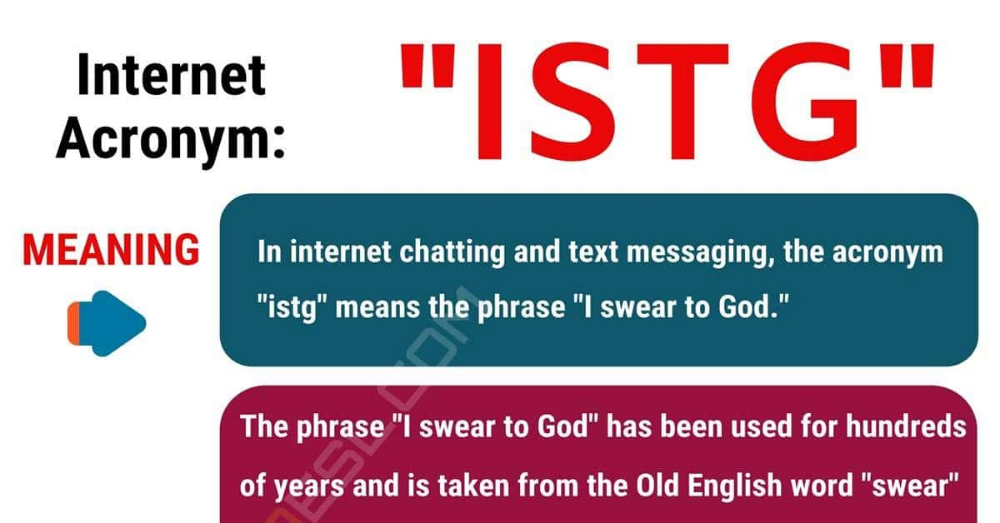In today’s fast-paced digital world, acronyms and slang fill our text messages, social media posts, and online conversations. These shorthand express
In today’s fast-paced digital world, acronyms and slang fill our text messages, social media posts, and online conversations. These shorthand expressions help people communicate quickly and express emotions efficiently. One such acronym that has become widely used is ISTG.
If you’ve come across ISTG in texts, tweets, or comments and wondered, “What does ISTG mean?” — you’re in the right place. This article will explain everything about ISTG: what it stands for, its origins, how it’s used, the emotions it conveys, and why it’s become such a staple in online communication.
Must visit: tradeinfinite

What Does ISTG Mean?
ISTG is an acronym for “I Swear To God.”
This phrase is a way to emphasize honesty, sincerity, frustration, shock, or seriousness in casual speech. While it references “God,” it’s generally used in an informal and hyperbolic way rather than as a literal religious oath.
By condensing this phrase into four letters, ISTG makes it quick and easy to type while still packing an emotional punch.
How Is ISTG Used?
ISTG is versatile and can express several emotions or intentions depending on the context:
1. To Emphasize Truthfulness or a Promise
When someone wants to convince another person they are telling the truth, ISTG can serve as a casual but strong assertion.
Example:
“ISTG, I didn’t break your phone!”
2. To Express Frustration or Annoyance
People use ISTG when something bothers or irritates them, adding weight to their complaint.
Example:
“ISTG, if the internet goes out again, I’m going to lose it.”
3. To Convey Surprise or Disbelief
When something shocking or unexpected happens, ISTG highlights the intensity of that feeling.
Example:
“ISTG I can’t believe they actually pulled that off!”
4. To Add Humor or Exaggeration
Often, ISTG is used in a playful way to dramatize a situation or emotion.
Example:
“ISTG this cake is the best thing I’ve ever tasted.”
Examples of ISTG in Real Online Conversations
- Text message:
“ISTG I was waiting for you at the cafe for 30 minutes!” - Instagram comment:
“ISTG your outfit is amazing 😍” - Twitter reaction:
“ISTG this movie was way better than I expected.” - Snapchat chat:
“ISTG if you don’t answer me right now, I’m coming over.”
The Origins of ISTG
The phrase “I swear to God” has been part of English-speaking culture for centuries, traditionally used as a solemn oath or strong assertion of truth. It often carried a religious undertone, invoking God as a witness to the honesty of the speaker.
With the rise of digital communication — texting, instant messaging, and social media — people naturally began shortening phrases for speed and convenience. Acronyms like LOL, OMG, and BRB became popular, and ISTG emerged as a way to abbreviate “I swear to God” for faster typing.
ISTG became especially common among younger generations who adopted internet slang as part of their everyday language.
Why Is ISTG So Popular?
Several reasons explain ISTG’s widespread use:
1. Efficient Communication
ISTG saves time and effort while still conveying a strong emotional message.
2. Expressive Power
It helps users express sincerity, frustration, or surprise clearly in text, compensating for the lack of vocal tone or facial expressions.
3. Relatability
Everyone experiences moments where they want to emphasize a point, and ISTG is a quick, relatable way to do that.
4. Cultural Trendiness
Used heavily by Gen Z and Millennials, ISTG is part of the dynamic internet slang landscape, signaling digital savviness and social belonging.
How to Use ISTG Correctly
ISTG is best reserved for informal, casual conversations. Here are some guidelines:
- Use ISTG when chatting with friends, peers, or online acquaintances.
- Avoid using ISTG in formal or professional communication.
- Be mindful of the audience — some might find it disrespectful due to its religious reference.
- Don’t overuse ISTG; too much can lessen its impact.
Variations and Related Slang
There are similar phrases and acronyms that express comparable ideas:
| Acronym/Phrase | Meaning | Typical Use |
| I swear | Literal or casual oath | Both formal and informal |
| No cap | “No lie” – Gen Z slang | Emphasizing truthfulness |
| For real (FR) | Confirming honesty | Casual, supportive |
| Honestly | Expressing sincerity | Formal or informal |
| IDK | “I don’t know” | Expressing uncertainty |
Each has its own nuance and context, so choose based on your tone and audience.
Pronunciation of ISTG
In spoken English, most people say the full phrase, “I swear to God.” The acronym ISTG is primarily a written shorthand and isn’t commonly pronounced aloud as “I-S-T-G.”
Possible Misinterpretations and Sensitivities
Although ISTG is widely used and mostly harmless, there are a few things to watch out for:
- Some religious individuals might find casual use of “I swear to God” disrespectful.
- Tone can be misunderstood in text — ISTG might come across as serious, sarcastic, or humorous depending on context.
- Overuse may dilute its effect and make it seem insincere.
ISTG Compared to Other Internet Acronyms
ISTG sits among a host of popular internet acronyms. Here’s how it compares:
| Acronym | Meaning | Use Case |
| ISTG | I Swear To God | Emphasizing honesty or frustration |
| LOL | Laugh Out Loud | Expressing laughter |
| OMG | Oh My God | Surprise or excitement |
| BRB | Be Right Back | Temporarily leaving conversation |
| SMH | Shaking My Head | Disapproval or disbelief |
ISTG is unique because it blends sincerity with emotional intensity, making it powerful for emphasis.
Cultural Significance of ISTG
ISTG illustrates how language evolves in the digital age. It demonstrates how:
- People shorten long phrases to keep up with fast-paced communication.
- Internet culture creates shared shorthand that fosters community and identity.
- Language adapts to convey emotion in text-based environments lacking face-to-face cues.
When Not to Use ISTG
- Professional Settings: ISTG is too informal and may be seen as unprofessional.
- Religious Contexts: Avoid if you suspect the audience might find it offensive.
- Academic or Official Writing: It doesn’t fit formal communication.
- Serious Situations: In sensitive or solemn conversations, ISTG may seem inappropriate or flippant.
Examples of ISTG in Popular Media and Social Platforms
ISTG is frequently found in:
- TikTok Captions: Users emphasize shock or excitement.
- Twitter Replies: Quick emotional reactions.
- Instagram Comments: Compliments or dramatic statements.
- Snapchat Messages: Casual, urgent exchanges.
FAQs About ISTG
What does ISTG stand for?
It stands for “I swear to God.”
Is ISTG offensive?
Not usually, but it can be in some religious contexts.
How do you pronounce ISTG?
People usually say “I swear to God” aloud; ISTG is a written acronym.
Who uses ISTG the most?
Primarily younger people, especially Gen Z and Millennials.
Can ISTG be used in professional communication?
No, it’s too informal and slangy for professional settings.
What are similar acronyms to ISTG?
“No cap,” “Honestly,” “For real,” and “I swear” are similar in meaning.
Conclusion
ISTG is a versatile and powerful internet acronym that captures a wide range of emotions, from sincere honesty to intense frustration and surprise. It’s part of the evolving digital language that helps people express themselves quickly and effectively in text-based communication.
Understanding ISTG not only helps you decode modern online conversations but also allows you to join in and express your own feelings with the same punchy flair.
Whether you’re texting friends, commenting on social media, or engaging in online communities, ISTG is a handy acronym to know. Just remember to use it thoughtfully, respecting the context and audience.




COMMENTS